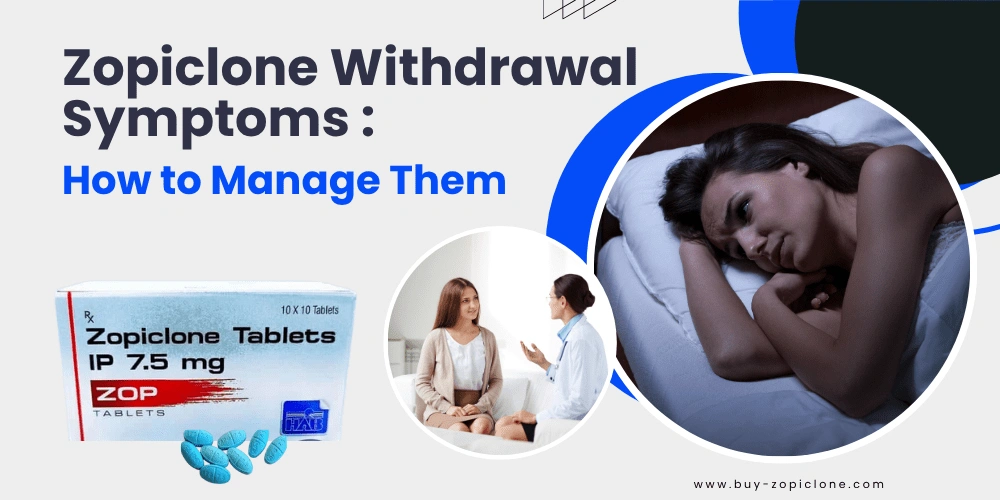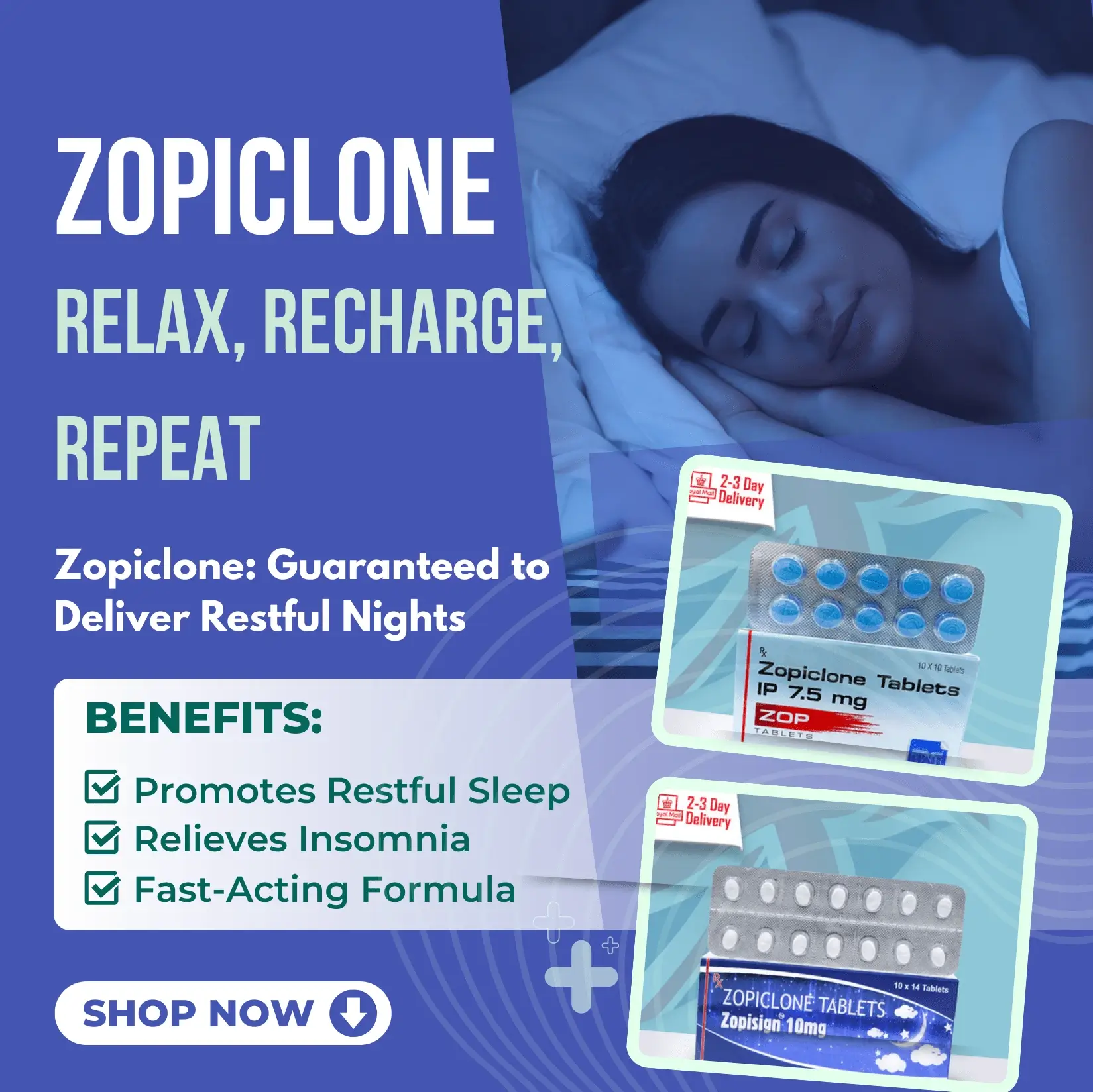Zopiclone Withdrawal Symptoms, How to Manage Them

How to Understand Zopiclone Withdrawal Signs
It may seem impossible to get through zopiclone withdrawal, but the good news is that you don't have to do it by yourself! Whether you are someone who takes zopiclone, a healthcare worker who helps patients, or a member of a support group, knowing what withdrawal looks like will help you deal with it. You will know what to expect, how to get ready, and how to get back on your feet more potent than ever by the end of this book.
What Does Zopiclone Really Mean?
Zopiclone is a funny drug with a significant effect. People with sleeplessness often take this prescription drug to help them sleep for a short time. It's like a sleep aid that turns off your brain to help you fall asleep faster. But there's a catch: you should only use it for a few weeks at most. Why? Zopiclone calms the nervous system by changing gamma-aminobutyric acid (GABA) receptors in the brain. Your body can become dependent on the drug over time, which is why slowly weaning off of it can cause withdrawal symptoms.
What does it look like to stop taking Zopiclone?
When you stop taking zopiclone, your brain and body get used to it as a "sleep crutch." When you stop taking the drug all of a sudden or cut back too quickly, your body goes wild. This is a fun (but necessary) fact: Did you know that withdrawal signs can show up in the mind and the body? Keep an eye out for these things:
Symptoms in the body include trouble sleeping,
- headaches, feeling sick, joint pain,
- sweating.
- Mood swings,
- anxiety,
- irritability and
- Even dreams are psychological signs.
Imagine giving your brain a "figure it out yourself" note after giving it help. It requires some change! But don't worry—these signs will go away on their own, and there are good ways to deal with them.
Getting ready for Zopiclone Withdrawal
To begin, quitting all of a sudden is not a good idea. Stopping Zopiclone 7.5mg all of a sudden can make symptoms worse, which can make the process really unpleasant (talk about extra roughness!). To get ready for the road ahead, here's your plan
Join forces with a pro: Before changing your dose, you should always talk to a medical professional. They've been through a lot and are your best friends.
Build a network of support: Call on your supporters, like family, friends, or a support group. When you have people behind you, withdrawal is a lot less scary!
Plan: It is best to slowly lower the amount of zopiclone you take, which is also known as tapering. Your doctor will show you the right way to do this.
Bonus tip: Writing in a journal can help you keep track of your symptoms and enjoy small victories. It can also be healing strangely.
How to Handle Zopiclone Withdrawal Signs
How do you get through the withdrawal wave without going crazy? That's the million-dollar question. The important thing is to find methods that work for you. Here are some valuable tips:
Fight insomnia: Set up a calm, dark, and quiet place to sleep. A routine for when you sleep and wake up also helps a lot.
Fear of the bust: Yoga or deep breathing movements can help calm you down faster than you might think. Has aromatherapy? It does help, however!
Keep drinking water, eat foods that are high in nutrients, and stay away from coffee for a while—it will make withdrawal worse.
Keep Moving: Light exercise, like walking or stretching, can help ease joint pain and stress.
A helpful hint is that apps like Calm and Headspace can help you rest and fall asleep. Note them down!
How Long Does Zopiclone Withdrawal Usually Take?
Want to know what's coming up? With breaks, here's what a typical timeline might look like. Remember that every person reacts differently.
Days 1–3 (Acute Phase): Mood problems, worry, and restlessness are at their worst. Some people say it's like a tug-of-war between being tired and having a brain that works too hard.
Days 4–7: The pain generally gets a little less intense, but you might still feel angry or sad. Don't forget to be kind to yourself!
Post-Acute Phase (Week 2 and Beyond): Symptoms keep getting better, but some may stay (for example, mild worry or cravings). Stay strong; this will pass, too!
When You Should Get Help from a Professional
Some withdrawals need a little extra help, but most of the time, they get better on their own. Don't be afraid to get help if your symptoms get out of hand or if you start to feel lost. Therapy and counselling (CBTs for worry or sleep problems) are great ways to get help.
- Changes to medications (to help with the change)
- Centres for Rehabilitation or Support
- In the end? There is help out there, and asking for it is the most powerful thing you can do.
How to Stay Strong After Zopiclone Withdrawal
It's a big win to make it through Zopiclone withdrawal, but it's just as important to keep going. Follow these steps for long-term healing success:
- Change the way you sleep: Stick to good sleep habits (we're looking at you, people who use their phones in bed!).
- Trust Your Tribe: Stay in touch with people who can help you or join online forums to get ongoing support and drive.
- Adopt ways to deal with stress: Finding joy in things you love, like climbing, painting, or baking 80s-themed cakes, is a lot like therapy.
- Studies have shown that if you meditate or practise mindfulness regularly, your brain can change in ways that help you rest and sleep better. That's what everyone wants.
You can do this!
It's not easy to go through zopiclone detox, but it's possible with the right attitude and help. Learn as much as you can first (good for you!); then, remember to ask for help from doctors and family members when you need it.
If you're ready to take the first step or need help along the way, don't be afraid to call or email a local support service. It's worth it for your health!
Please log in to add a comment.
Popular Posts
Sleep Problems in Women: What UK Women Need to Know
How to handle not being able to sleep in UK
Managing Stress and Insomnia with Zopiclone Tablets: A Guide 2025
Zopiclone Withdrawal Symptoms, How to Manage Them
Chronic Insomnia? Here's How Zopiclone Can Help (A Safe Guide)
Is Zolpidem Better Than Zopiclone in the UK? A Comprehensive Comparison
Buy Zopiclone in London: NEXT-DAY Delivery for Better Sleep
Zopiclone mixed with alcohol and other drugs
Our Popular Treatments

Dr. Kelly
Introduce yourself to Dr. Kelly, a distinguished figure in the medical profession. The passion for healthcare and the invaluable knowledge of Dr. Kelly, despite his retirement from active clinical practice, remain as vibrant as ever. He now focuses his extensive 20-year medical experience on our pharmacy's blog, thereby supporting our mission to educate and empower our valued customers.
.svg)
Delivered in secure, plain packaging on fully tracked delivery from just £10.

Our team of doctors and pharmacists, and our support staff, are all UK-based.
.svg)
Have a question? Telephone support is always free; Monday - Friday, 9am - 5pm.

Comments........!